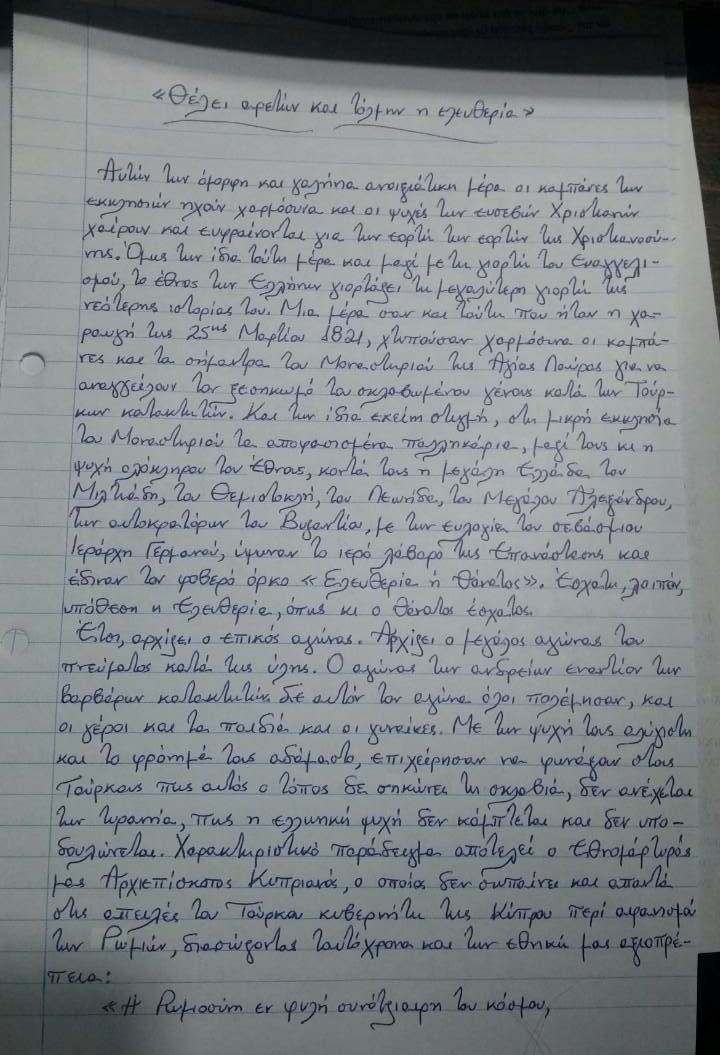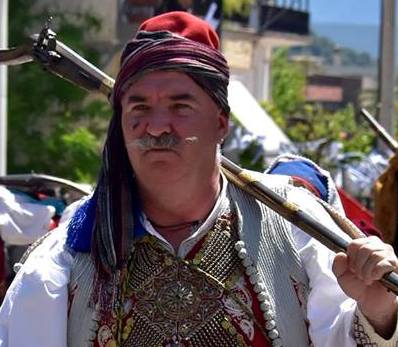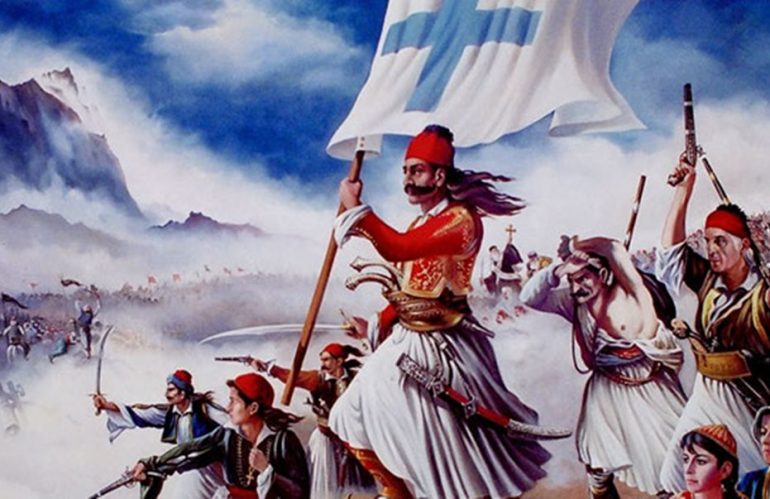How many times have we heard that student youth do not know what March 25 or October 28 means?
How many times have we heard that the student youth of the Elementary, High School and Lyceum do not know what March 25 or October 28 means? What role did the Revolution of 1821 play for Greece and today's Greeks?
Our research on high school children and parents, showed that most people not only know but also look forward to feeling in their soul that day. They know well what a national holiday means and what Greek History means.
The text that follows is by Katerina Papaioannou, student of GY Lyceum, Lyceum of Kokkinochorion Foti Pitta.
"Freedom wants virtue and courage"
"On this beautiful and peaceful spring day the bells of the churches ring joyfully and the souls of the pious Christians rejoice and rejoice for the feast of the feasts of Christianity. But on the same day and together with the feast of the Annunciation, the Greek nation celebrates the greatest feast in its recent history. A day like this that was the dawn of 25th In March 1821, the bells and beacons of the Monastery of the Holy Lavra rang joyfully to announce the uprising of the enslaved race against the Turkish conquerors. And at the same time, in the small church of the Monastery, the determined young men, with them the soul of the whole nation, near them the great Greece of Miltiades, Themistocles, Leonidas, Alexander the Great, the emperors of Byzantium, with the blessing of the venerable Hierarch Germanos, raised the sacred banner of the Revolution and took the terrible oath "Freedom or Death". Freedom, then, is the last resort, as is death.
Thus begins the epic struggle. The great struggle of spirit against matter begins. The struggle of the brave against the barbaric conquerors. In this struggle everyone fought, both the old and the children and the women. With their souls helpless and their minds indomitable, they tried to shout to the Turks that this place does not raise slavery, does not tolerate tyranny, that the Greek soul does not bend and is not enslaved. A typical example is our National Martyr Archbishop Kyprianos, who does not remain silent and responds to the threats of the Turkish governor of Cyprus about the annihilation of the Romans, while preserving our national dignity:
"Romiosyni in a race united with the world,
no one was found to lick it,
nobody, because my God silences the one who bakes them.
Romiosyni is lost, while the world is missing!
In those dark and difficult hours, men with spirits like Ypsilantis, Makrygiannis, Kolokotronis and the rest of the helpless warriors, held high the flag of Freedom. And of course, it was not logic that kept them standing and invincible in that stubborn resistance to the end. But it was the heart and the soul, that only they can lift man on their wings to the highest peak of humanity and glory. "Greatness in nations is not measured by acre, by heart the fire is also measured by blood", as Kostis Palamas claimed.
Makrygiannis' so simplistic and popular phrase "they eat from us and leave yeast" reveals the power of life that the Greek race hides. Greeks, although few, always fight for their freedom, relying on moral forces, not material ones. Many are lost in the face of the enemy, but the tribe manages to survive, protected by the Almighty. All the beasts fight to eat them and they can not, as the few Greeks project their heroic "madness" and do not count death. Always fighting, the nutcracker unrelenting in the hand, the pilgrim papers torn and burned, day and night in battle, they managed to return Freedom forever to the place where it was born.
Vivid images of faith, virtue, love are projected by the heroes of 1821, eternal role models for every Greek, but for every enslaved people. They taught through their struggle that the few, when they are ready to sacrifice themselves for the acquisition of the breadth and very ideal of freedom, in the end they achieve it. The words of General Makrygiannis, "We are in" we "and not in" I "", exude the spirit of solidarity, collectivity, cooperation and humility of the Greeks of 1821.
Today new forms of enslavement and captivity oppress the homeland and its people, various events shake the human soul. For all this we need true heroes, to draw the patterns of life against those who humiliate us, inspired by a fighting spirit, a commitment to higher ideals and moral values and a willingness to sacrifice. Our final freedom will be thrown out of the "sacred bones" of our heroes, following their example, their struggle for freedom. Let us shake off the yoke of matter and let us seek first and foremost our spiritual freedom and independence. May Panagathos help the "yeast" of Makrygiannis' generation to swell quickly, to become bread for the "Holy Communion".

A story that happened in 1821 in Messolonghi…
Nikos Plakidas is one of the few "guardians" of the Greek tradition. He was born in 1965 during the Occupation of Messolonghi and from a young child he showed his love for the folk tradition of Etoloakarnania and Messolonghi. From his teenage years, he started collecting authentic costumes, studying how to make them, but also pioneering local customs, festivals and traditional celebrations. He is about to write a book that will include all the stories his grandparents told him.

Nikos Plakidas reports in ant1iwo:
«The city of Messolonghi was besieged for a whole year by the Turks. It was bombed repeatedly but when the Turks realized that the Messolonghi had no chance of surrendering, they besieged the city in such a way as to cut off all supplies of food and ammunition.
Throughout the siege of the city, the Messolonghi women stood by the warriors, encouraging them and helping them to care for the wounded and to transport ammunition.
In the decision for the heroic exit…
The women of Messolonghi decided to sacrifice themselves together with the male warriors. Some dressed in men's clothes and died fighting while others were taken prisoner by the besiegers. The heroic attitude of the women of Messolonghi was reflected literary, among others, in the poetic poem of Dionysios Solomos, "Free Besieged".
This story was told to me by my grandmother…
The Turks at some point spoke with the Greeks and agreed to end the war for a few hours. Then, some pashas passed through the wide groove that separated Mesolongi from the Turkish camp. Some Greek chiefs also came out, along with the chief Mitsos Kontogiannis. He was dressed in his good costume and his psychic child, he was holding his pipe with the smoke. He wanted to show the Turks that: Slow down the siege, we are having a good time. Supposedly!
There was no clean water at all but dirty. But they cleaned it a little and brought it to the pashas to drink. They also made the table for them. They wanted to show them that they lacked nothing and let them starve to death. They were proud Greeks, real lads who sacrificed everything for their country.
Long live the 25thη Of March! Long live Hellenism! "
Source: ant1iwo.com
